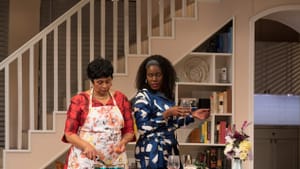Stay in the Loop
BSR publishes on a weekly schedule, with an email newsletter every Wednesday and Thursday morning. There’s no paywall, and subscribing is always free.
Never alone
The Wilma Theater presents Jackie Sibblies Drury’s Fairview

It’s a difficult task to review Jackie Sibblies Drury’s 2019 Pulitzer-winning dramedy Fairview without offering spoilers. But one thing I can say is that it takes the form of the traditional European three-act structure, and in the Wilma Theater’s propulsive production, the whole thing barrels forward in around 100 minutes.
Also, it shows that Black people can be anything these days: upscale, downscale, sideways, doctors, lawyers, maybe not Indian chiefs, as long as they’re, you know, THEM. And funny. We like them funny. “We,” of course, are keepers of the white gaze, a gaze Drury masterfully, empathetically inverts by the time the whole thing is through.
Beyond the Big Event
Director James Ijames, who also happens to be the most recent drama Pulitzer winner, knows a thing or two about that majority ticket-buying gaze. Suffice it to say it’s no accident he includes yet another Black Pulitzer winner, Kendrick Lamar, on the show’s playlist, with “Backseat Freestyle,” one of the rapper’s most ironically outrageous and least family-friendly songs.
The show’s first act depicts a well-worn dramatic trope: bourgeois family prepares dinner for a fraught, celebratory Big Event. Their style is presentational and scripted like that sitcom with the Black folks; you know the one.
The family in question includes Melanye Finister and Lindsay Smiling’s harried homeowners Beverly and Dayton, Beverly’s sister Jasmine (Jaylene Clark Owens, taking a page from Jackée Harry’s sassy TV playbook), and overachieving daughter Keisha (Brett Ashley Robinson). Before Lawrence E. Moten’s living-room set, a striver’s bland version of high-ceilinged suburban square footage, retorts fly, tension builds. And then, it begins again, as we realize this family isn’t alone—is never truly alone.
I don’t love Ijames’s decision to stage some of the action behind the house’s back wall, partially obscured by venetian blinds. Some productions feature this section of the script only in voice over, and that may or may not be more effective; the issue for me is that the structure of Moten’s set (if we’re meant to see these characters, why not one big picture window, rather than three segmented ones that cut off the staging?) is unnecessarily distracting.
However, once Matteo Scammell’s Jimbo launches into a ferocious Sigma Male/Joker culture diatribe, there’s no mistaking the message or its implied threat. He sneers, “Like, you don’t just build your whole life around brutality by mistake. You have to want that. You have to plan that. And people don’t think about that. But I think about that. My mind works different.” It’s the chilling sound of a thousand 4chan boards and Reddit threads made flesh.
Begging for discussion
There are shades of Young Jean Lee and Taylor Mac, and sure, Amiri Baraka’s here too, all playwrights who delve deeply into the themes of community and identity constructed from within and without. Fans of Donald Glover’s groundbreaking television show Atlanta will also recognize at least one theme from this season’s episodes. But in the context of right now, the power of live theater has never felt more immediate.
Last season, the Wilma’s filmed production of Ijames’s Fat Ham brought a rare theatrical bright spot to what felt like interminable isolation. While Fairview was written before the pandemic, and long before the South Street mass shooting on the same night this Wilma production opened (13 blocks away), Drury has truly met the moment. This experience, of everyone in one room, wrestling with her material together and individually, listening and actively participating—there’s just no substitute for it.
The message audience members receive depends entirely on who they are. This is the kind of work that begs for post-curtain discussion with people who are and are not at all like you. That’s the reason live theater exists: as a tool for illumination, understanding, and above all, building a community based on challenging ideas and making intellectual connections. Ijames, Drury, and the Wilma invite you in, yes to be entertained, but even more, to make space for one another.
What, When, Where
Fairview. By Jackie Sibblies Drury, directed by James Ijames. $29-$59. Through June 26, 2022, at the Wilma Theater, 265 S. Broad Street, Philadelphia. (215) 546-7824 or wilmatheater.org.
The Wilma requires proof of Covid-19 vaccination, and masks must be worn inside the theater.
Accessibility
The Wilma Theater is a fully accessible venue with wheelchair seating reserved through the box office. Assisted listening devices are available at all performances. The Saturday, June 11 performance at 2pm will feature open captioning, and the Saturday, June 18 performance at 2pm will feature audio description. Contact the Wilma box office to use these services or request other accommodations.
Sign up for our newsletter
All of the week's new articles, all in one place. Sign up for the free weekly BSR newsletters, and don't miss a conversation.

 Wendy Rosenfield
Wendy Rosenfield